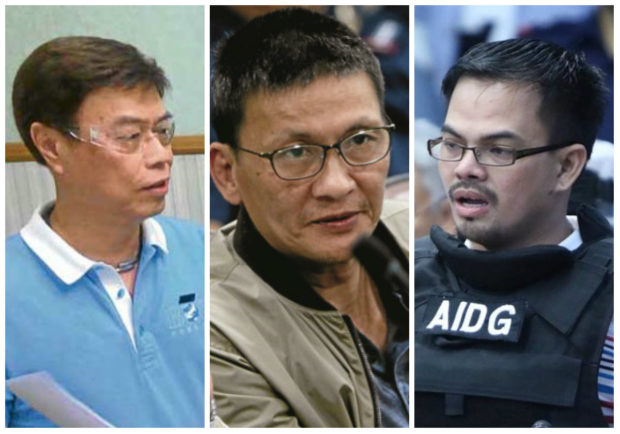Justice Secretary Vitaliano Aguirre on Tuesday said the dismissal of the drug case against Cebu-based businessman Peter Lim, self-confessed drug distributor Kerwin Espinosa and several others should be a ‘wake-up call’ to authorities to be “concerted and thorough.”
Aside from Lim and Espinosa, also cleared of charges for violating the Comprehensive Dangerous Drugs Act of 2002 are convicted drug lord Peter Co, Marcelo Adorco, Max Miro, Lovely Adam Impal, Ruel Mangalindan and Jaime Jun Pepito, a village councilor in Albuera, Leyte and individuals identified only by their aliases namely Jeremy aka “Amang,” Ricky,”Warren,”Tupie,”Jojo,”“Yawa,” Lapi,” Royroy,”Marlon,” Bay,”John Doe” (an alleged delivery man of Co), “Peter Doe” (an alleged delivery man of Lim) and “Robert Doe” (also an alleged delivery man of Lim).
The case against Lim and the others were dismissed for insufficiency of evidence.
“[The dismissal of the complaint] is a wake-up call to all concerned that our efforts, from apprehension to resolution to conviction must be concerted and thorough,” Aguirre said.
Aguirre said the dismissal of the case is but “a slight bump on our war against drugs.”
Aguirre added that the dismissal of the case is “not a final exoneration” of all the respondents’ criminal liabilities.
“Under our present procedure in the DOJ (Department of Justice), there are possible avenues to review this case, either by a motion for reconsideration, or ultimately, by way of automatic review by my office,” Aguirre said.
Aguirre cited the case of the P6.4-billion shabu shipment which was previously dismissed in favor of Customs officials but was refiled with additional evidence submitted.
The DOJ resolution dismissing the case against Lim, Espinosa and the others heavily relied on the testimony of its witness Adorco, whose testimony, according to the prosecutors was “rife with inconsistencies and contradictions.”
Among the inconsistencies cited by the DOJ are the following:
In his first affidavit, he said he personally met Peter Lim in Thailand in 2014 but he corrected it in his supplemental affidavit that the meeting took place in 2015;
In his first affidavit, he said he, Kerwin and Impal visited Co at the Metropolitan Hospital in 2014 but it was changed to 2015 in his supplemental affidavit;
In his first affidavit, Adorco said Kerwin and Lim have a total of four transactions in 2014 but in his supplemental affidavit he said that per transaction involved 40 kilos of shabu.
Adorco failed to mention a certain “Ozamiz Mayor” in his first and supplemental affidavits. He only mentioned the “mayor” in his third affidavit.
Adorco said Lim promised to give Kerwin 20 kilos of shabu when they met in Thailand but in his supplemental affidavit, he said the promise was actually 50 kilos.
“The inconsistencies in Adorco’s affidavits pertaining to dates and place of meeting with drug supplier where the initial drug deal was made; the months and years covering the drug transactions and the volume of drugs involved; the number of drug deliveries and quantity involved; the identity of the alleged drug courier of the supplier who delivered the drugs; the persons present during the time the drug deal was hatched cannot be considered inconsequential,” the DOJ resolution stated.
“For an evidence to be believed, it must proceed not only from mouth of a credible witness but must be credible in itself as to hurdle the test of conformity with the knowledge and common experience of mankind,” read the resolution.
“To our view, the discrepancies in Adorco’s affidavits have seriously impaired their probative value and have [cast] serious doubt on their credibility,” the DOJ resolution further stated.
In refuting Adorco, Lim said the alleged meeting in Thailand could not have taken place because he was confined to a hospital in 2015 due to kidney problem.
Both Lim and Kerwin also told the DOJ that authorities failed to produce as evidence the ‘corpus delicti’ of the offense referring to the drugs and/or the money involved in the transaction.
The DOJ said, the police failed to present “other evidence…to substantiate or corroborate” the allegations of Adorco.
“The uncorroborated statements of Adorco, which are the only evidence against the respondents have no probative value and are inadmissible in evidence against them,” the resolution stated.
The DOJ added that even the news report clippings that the police attached to their complaint cannot help their case.
“To stress, these news articles have no probative value since under the rules on evidence, they are hearsay, inadmissible and incompetent to establish the facts therein…He who asserts a fact must prove, not he who denies,” further stated in the DOJ resolution.
The resolution noted that Lim submitted various documentary evidence to prove that he was not the person being accused by Adorco. In response, the DOJ resolution noted that the police alleged that the documents were fake.
“Other than these bare assertions, complainant has again failed to present satisfactory proof that those documents were fraudulently issued,” the resolution noted.
As to Kerwin, the DOJ noted that a similar case is pending before the Manila Regional Trial Court. The drug case pending was also based on Adorco’s testimony.
READ: Witness vs Kerwin withdraws testimony
READ: Espinosa, Espenido face-off at Manila court in drug case trial
The DOJ resolution reminded the police to “gather more concrete and competent evidence proving that respondents and other individuals are indeed involved in illegal d rugs activities, then there is no reason why they cannot file another case against them.”
The DOJ cautioned the police from “filing cases on the basis solely of an uncorroborated testimony of an evidently self-serving witness.”
/muf/ac
